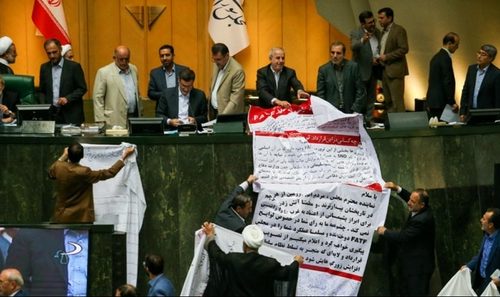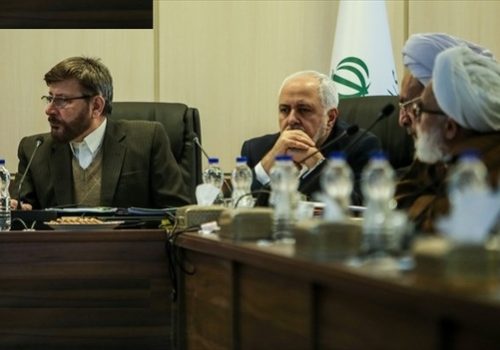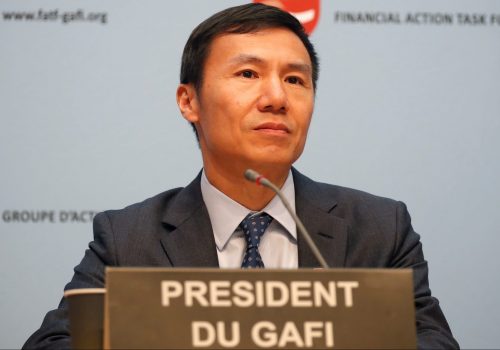FATF blacklists Iran, but does it matter?
The Financial Action Task Force (FATF)—an intergovernmental, technocratic anti-money laundering (AML) and counter-terrorist financing (CFT) body—on February 21 voted to re-impose counter-measures on Iran for Tehran’s lack of progress in passing AML and CFT legislation. The move, taken shortly after Iran’s Expediency Council quashed legislation passed by the parliament, was the culmination of more than four years of efforts by the FATF to push Tehran to pass basic AML/CFT legislation in the wake of the 2015 Joint Comprehensive Plan of Action (JCPOA) in an effort to get itself out of the small club of nations that willfully flaunt international financial norms. Iran’s only partner-in-crime, as it were, is none other than North Korea—a government that is essentially a global money-laundering syndicate.
The decision to impose counter-measures by the Paris-based body signals something of an end to the group’s patience with Iran, especially by the European Union, after Tehran failed to follow through on the action plan it agreed upon with the FATF to address its deficiencies. As a technical matter, the FATF’s decision is unassailable. Iran has not signed onto required international agreements, has no credible AML/CFT laws more than two years after its action plan expired, and flagrantly finances terrorist groups, the Gazan militant group Hamas and Lebanese Hezbollah chief among them. These deficiencies are despite years of the FATF giving Tehran more chances to address its issues than any other nation would have gotten. Make no mistake, this is a self-inflicted wound for the Islamic Republic.
The re-imposition of counter-measures means that countries are called upon to protect the international financial system from money laundering and terrorist financing threats from the target jurisdiction. In practice, this means significant due diligence on or even total cut-off of the target’s banks, greatly hampering the jurisdiction’s ability to conduct cross-border financial transactions.
But does the FATF’s action actually matter? In short, no.
The Iranian rial fell after the vote, but the impact of the FATF’s action will almost certainly be little more than symbolic. Although the FATF had moved Iran off of the “counter-measures” list shortly after the JCPOA was implemented in 2016, Iran remained on the group’s blacklist—indicating a need for enhanced due diligence by financial institutions. Major global banks are often unwilling to take on the extra risk and cost of conducting enhanced due diligence and will choose to de-risk i.e. stop transacting with such counterparties.
Moreover, in the years that Tehran had been under strict international sanctions prior to the Iran nuclear agreement, the world of global finance concentrated even more around the US dollar. It is extremely difficult to conduct cross-border transactions at any scale without having to tap dollar markets to facilitate the currency conversion. Even before President Donald Trump’s withdrawal from the JCPOA, US primary sanctions that remained after the deal were a significant hurdle to international transactions with Iran.
Trump’s withdrawal from the deal, of course, made things even worse for Iran. Instead of the more neutral tone following the JCPOA, senior US diplomats now traverse the world threatening banks and companies over even seemingly non-sanctionable trade with Iran, under the guise that any transaction with Tehran could benefit the Islamic Revolutionary Guard Corps (IRGC) or other bad actors. Re-imposed US secondary sanctions, complemented by that chilling tone, had severely constrained Iran’s already limited access to global financial markets even before the February 21 decision. Accordingly, global banks are unlikely to do anything new in response to FATF’s call for counter-measures. There is little left to do for banks that already had avoided transactions with Iran.
Looking forward, one can draw a couple of conclusions. First, the defeat in the Expediency Council of legislation passed by parliament suggests that forces affiliated with more hardline elements like the IRGC have more favor in the domestic Iranian power struggle. These elements have long fought against AML/CFT legislation—and indeed, closer alignment with the west—because they argue it undermines the revolutionary nature of Iran’s government. Countering the financing of terrorism is rather obviously antithetical to funding Hezbollah and Hamas and to the IRGC’s overseas misadventures. These forces having more of the upper hand in Tehran bodes ill for those who want to see greater rapprochement between Iran and the west, and for any prospects of forging a revised nuclear deal.
Second, the EU now has additional leverage to push back on Iranian complaints that it is not receiving benefits owed it under the nuclear deal. The EU can credibly accuse Tehran of going back on its commitments under the FATF action plan and point out that even if European businesses wanted to do business with Tehran, the FATF counter-measures would stand in the way of better economic relations, nuclear deal or not.
It remains to be seen whether Iran will respond specifically to this decision by the FATF. The Islamic Republic has been on a cadence of rolling back its nuclear commitments under the JCPOA roughly every 90 days, so it may very well wait a few weeks until that clock is up again after its latest rollback in December 2019. In the meantime, it will continue to assail the decision as politically motivated—complaints that will likely fall on unsympathetic ears, even from those unhappy with the US re-imposition of sanctions. If anything, the FATF’s four-year reprieve to Iran was politically motivated. The February 21 call for counter-measures is strictly in line with the body’s technocratic nature.
Brian O’Toole is a nonresident senior fellow with the Atlantic Council’s Global Business and Economics Program. He is a former senior adviser to the director of the Office of Foreign Assets Control (OFAC) at the US Department of the Treasury. Follow him on Twitter @brianoftoole.
Image: Iranian protesters burn an FATF banner as they attend an anti US demonstration, marking the 40th anniversary of the US embassy takeover, (Reuters)


